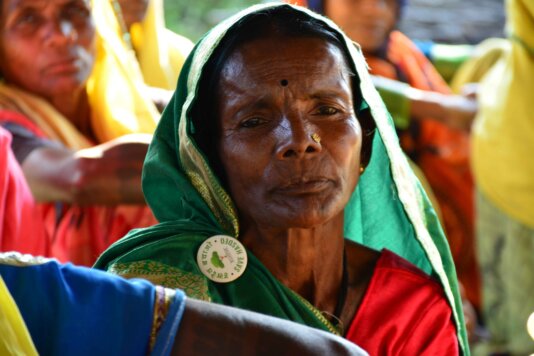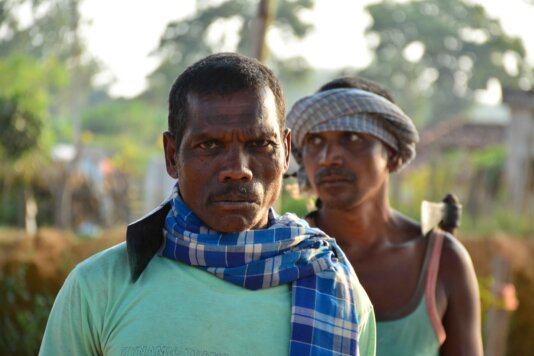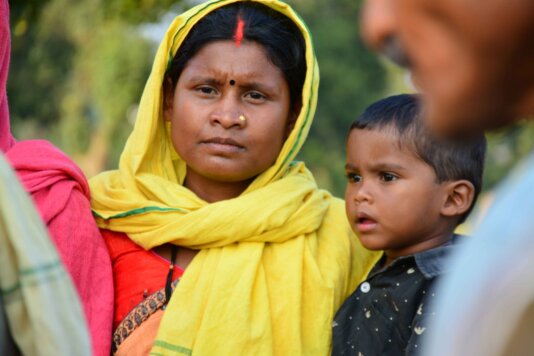- About
- Topics
- Story
- In-Depth
- Picks
- Opinion
- News
- Donate
- Signup for our newsletterOur Editors' Best Picks.Send
Read, Debate: Engage.
| June 07, 2023 | |
|---|---|
| topic: | Conservation |
| tags: | #India, #indigenous lands, #deforestation, #coal-mining |
| located: | India |
| by: | Aaquib Khan |
Dark debris flies in the air, followed by dynamite explosions. The massive sound rattles the forest and a plume of grey coal dust engulfs the area for several minutes. Standing on the edge of a ridge in India’s Parsa, a little way off from the blast site, Ram Kumar is flooded with rage and agony. He is witnessing a calamity, a post-apocalyptic landscape.
Gautam Adani's Adani Enterprises Limited (AEL), a multinational conglomerate, has turned a lush green forest into a gigantic pit, where 18 million tonnes of coal is mined every year. Parsa East and Kanta Basan (PEKB) is the ravaged land - an open-cast coal mine in the Hasdeo Aranya (Hasedo forest).
Kumar is employed in the same mine. Once, a village called Kete with around 200 families stood there, surrounded by a pristine Sal (Shorea robusta) forest; it was his home. "I put gunpowder into the ground after the drilling to create an explosion," Kumar tells FairPlanet. With a monthly salary of 10,000 Rs (USD 121), he was hired by AEL to wipe out his own house, the forest he worshiped, his village and his memories.
"I was a farmer, and I was happy, but now my land is gone," Kumar says in a melancholy tone. He is a member of the Gond tribe, one of the 700 indigenous tribes in India.
The Hasdeo Aranya region covers the districts of Korba, Surajpur and Surguja in the northern Chhattisgarh State. Hasedo is one of the biggest intact dense forests in Central India, spanning over 170,000 hectares. It houses billions of tonnes of power-grade coal lying in one of the largest reserves of coal in the country. The Hasdeo Coalfield is spread over 1878 sq. km, of which 1,502 square kilometres are forested.
Hasdeo Aranya is also the site of India's longest anti-coal protest by indigenous communities.
Kumar was in his teens when the heads of his household sold their land to Adani under "pressure and greed," he says. Adani's agents persuaded Kumar's elders, along with other villagers, to relinquish their land for the coal mining operation. The latter, however, were reportedly not informed about the devastating effects that coal mining would have on their forest, livelihood, air, water and farms; they did not realise this enterprise would displace and make them vulnerable to exploitation. From the beginning, some locals opposed the move and even protested against the promise of 'development' of the village, roads, electricity and water facilities and jobs in the mine made by the company's Dalals (middlemen).
Notably, Gautam Adani has been a close ally of Indian Prime Minister Narendra Modi, who auctioned 41 new tracts of land for coal mining as part of his Unleashing Coal campaign. Launched in 2020, the campaign was part of Modi’s larger plan to exploit coal for the establishment of a Atmanirbhar Bharat (self-reliant India), which was a central pillar of his pandemic recovery plan. The campaign is focused on developing and utilising domestic resources to reduce reliance on coal imports and preserve foreign currency.
One of the chief beneficiaries of Modi's coal policy, which sees coal as an essential element of India's economic growth, is Adani. According to a March 2023 press release from the Ministry of Coal, the ministry has auctioned off 87 mines in less than three years, leading to a significant increase in coal production in the country. Specifically, coal production has risen from 565 MT during the 2013-2014 period to 893 MT in 2022-2023.
"[The] words and deeds of our government are different. The head of our country, Prime Minister Narendra Modi, has flawed thinking. Private companies can benefit - that's why coal mining is promoted," said Umeshwar Singh Armo, the head of Paturiadand village who has been leading the protest against coal mining in Hasedo for nearly a decade.
In the UN climate summit in Glasgow in 2021, Modi vowed that half of India's energy would come from renewable sources by 2030, and that the country would achieve net-zero by 2070.
Armo is sceptical about this pledge. "Our government said something in such conferences, and at home did something else."
Over time, the resistance to the coal mine weakened in Kete. The central government then allotted the Parsa East Kanta Basan (PEKB) mine to the state energy firm Rajasthan Rajya Vidyut Utpadan Nigam (RRVUNL) in 2007. In 2008, RRVUNL selected the privately-run Adani Group as the official Mine Developer and Operator in this venture, the first such contract in India’s history.
In 2009, the central government categorised Hasdeo Aranya as a ‘no-go' zone for mining due to its rich biodiversity. However, the environment minister at the time, Jairam Ramesh, revoked this status in 2011 and granted a stage I forest clearance to the Tara, Parsa East and Kanta Basan coal blocks in the region.
By 2013, Adani had established a foothold among the villagers through a combination of questionable tactics, including illegally cutting down trees and using various means to gain influence and control. As a result, the company was able to commence coal mining operations in the area. The PEKB mine is located in one of 23 coal blocks of the Hasdeo Arand Coal Field (HACF).
The locals whose land was acquired by AEL did not only receive compensation, but the company has promised a job in the mine for one member of each family. But the jobs given to them did not match their skill sets, and so very few of the area’s residents actually managed to secure employment in the mines. Those who did ended up working mostly as security guards or drivers.
Coal in the PEKB coal block reserve was exhausted last year, seven years before the approved timeline. And despite the decade-long agitation of indigenous people against mining and deforestation and several cases pending in courts, MoEFCC issued the final forest clearance for mining in Parsa in October 2021.
The ruling Congress party's spokesperson Dhananjay Thakur told FairPlanet that his government is not supporting the central government's new extension plans for coal blocks in Hasdeo. "People's emotions are associated with the forests, so no new mining shall start there. Chief minister Bhupesh Baghel has written a letter to the central coal minister asking to annul this allotment," he said.
Chhattisgarh is one of the foremost mineral-rich states in India. In 2022-23 the state earned a record revenue of Rs 129.41 billion from minerals, a Rs 6.36 billion increase from the previous fiscal year. When asked why the state government hasn’t nullified the permission of the new mines, Thakur said, "The central government is responsible for deciding the projects and issues related to coal."
Alok Shukla, convener of Chhattisgarh Bachao Andolan, a collective that fights for community rights and self-governance, counters Thakur's statement: "It's false. It's [meant] to create confusion. Land and forest are both in concurrent lists, in which the centre and state both have powers. Minerals can be allocated by the central government, but without state governments' consent - no minerals can be excavated."
After the approval was granted in April last year, Adani's forest authorities and officials swiftly arrived to axe down trees in the area. But when some local women in Janardanpur (Surguja district) caught wind of their action, they hurried over to the spot and hugged the trees to save them from loggers.
Nandai, a middle-aged Gond Adivasi, was leading the group of women who hugged the trees. "The trees are like our children. They give us clean air, fruits and flowers. My family and I won't allow anyone to cut them down."
The authorities left the spot due to the protest. But around 4:00 AM, they returned, blocked all the roads and alleys, converted villages into police cantonments, arrested the Mukhiya (village heads) who opposed the mining and hacked around 300 trees in the area.
In October 2021, a 300-km-long march was undertaken by around 350 people from tribal villages in Hasdeo Aranya to Raipur, the capital of Chhattisgarh, protesting against the illegal land acquisition by Adani.
Locals have set up a thatched tent in Hariharpur, not far from the decade-old Parsa East Kanta Basan coal mine. Every day, villagers hold sit-in demonstrations, where they sing, dance and shout slogans against Adani. Thirty-five-year-old Sunita Purte from Surajpur, a mother of four, is among the leading local voices against mining in the area and regularly attends this protest site.
"I asked one of the agents of Adani: [you can take] the coal and in return give us electricity, but once the Hasdeo is destroyed, how will you give us oxygen? Once the rivers are dried up or polluted, how will animals and birds survive?" Purte shares.
Protesting villagers allege that the 2018 documents RRVUNL and Adani used to demonstrate the approval for the coal mine are forged since no Gram Sabha signing meeting took place. They further claim that the consent list includes names of people who were already deceased.
"We had called the Gram Sabha for another reason to discuss with villagers, not related to the mining; when it was over, the Sub Divisional Magistrates (SDM) of Udaipur, Lakhanpur and Ambikapur called the Sarpanch (Head of village) and secretaries of villages and intimidated them to write on a paper that they gave consent for mining," says Armo, the head of Paturiadand village.
For more than three years, protesters have been demanding an investigation into the Gram Sabha case. They organised a meeting with Chhattisgarh's chief minister, Bhupesh Baghel, and Governor Anusuia Uike to discuss the matter, but the government has yet to take any action.
The Parsa coal mine covers an area of 1,252.447 hectares in the Surguja and Surajpur districts, including 410 hectares of forest land. Activists warn that mining in these two areas will result in the felling of over 450,000 trees, negatively affecting biodiversity and displacing approximately 700 residents from the villages of Fatehpur, Hariharpur and Salhi.
A joint study on coal mining in the Hasdeo Aranya area was conducted from 2019 to 2021 by the Indian Council of Forestry Research and Education (ICFRE) and the Wildlife Institute of India (WII). While ICFRE advocated for additional mining in the area with strict environmental safeguards, WII's report advised against it and recommended that the Hasdeo Aranya coal fields and surrounding territory be declared no-go areas.
Both organisations agreed that opening more areas for mining would harm biodiversity conservation and the livelihoods of people living in the region.
The ICFRE report is now used by the governments to launch additional mining projects in Hasdeo Aranya.
A decade ago, families displaced from Kete were relocated to a village called Basan as part of a rehabilitation package provided by the company. It was a new experience for the indigenous people who were used to living in big huts in the forest. The rooms were tiny and could not accommodate their extended family members, the animals and farming equipment.
Most of the inhabitants in Basan left their houses and came up with alternate arrangements. The forest does not confine their lives, but displacement does. It also stripped them from their identity, culture, language, livelihood and ancestral way of living.
Referring to the people who sold their land in Kete, Purte from Surajpur states is certain she won’t follow the same path.
"I won't make that mistake. I'll fight till the end; we can't lose this battle!"
Image by Aaquib Khan
By copying the embed code below, you agree to adhere to our republishing guidelines.



